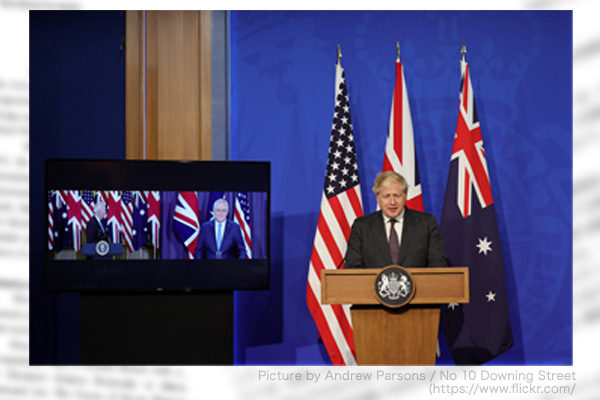The United States, Britain and Australia are now promoting a project for the Australian Navy to acquire a nuclear-powered submarine under their AUKUS security partnership framework they created in September 2021. In addition, the three countries announced on April 5 that they would cooperate as a part of AUKUS in the development of hypersonic weapons. Behind the AUKUS creation have been serious U.S. and Australian concerns about China’s hegemonic expansion into the Pacific, the South China Sea and the Indian Ocean. Australia and the United States aim to incorporate Britain into the Indo-Pacific security at multiple levels. Their announcement on cooperation in the missile development may indicate that the three countries known for their close relations over more than 100 years are determined to further enhance deterrence against China.
Mutually complementary relationship with Quad
On Japan’s attitude towards AUKUS, then Japanese Foreign Minister Toshimitsu Motegi last September said that Japan welcomed the AUKUS creation as enhancing the three countries’ involvement in the Indo-Pacific region. But Japan has not clarified how it would engage with AUKUS. A Taiwan contingency will naturally mean a Japan contingency, affecting Japan’s security. In addition to the U.S. willingness to defend Taiwan, peacetime British and Australian involvement within the AUKUS framework serves as great support for Japan’s security. From this perspective, Japan should make clear its stance on AUKUS.
Asked about the expansion of AUKUS membership, then British Chief of the Defense Staff Gen. Nick Carter answered that AUKUS was not exclusively designed (Australian Broadcasting Corporation, October 21, 2021). I recognize AUKUS participation could come in a variety of forms from full participation to limited one focusing on specific areas such as cyber, artificial intelligence and quantum technology. AUKUS should be utilized for building multi-layered, mutually complementary security arrangements that include the Quad, or Japan-U.S.-Australia-India Quadrilateral Security Dialogue.
Approach to AUKUS may emerge through discussions
Of course, there are some challenges. For instance, the three AUKUS countries are core members of the Five Eyes intelligence-sharing alliance that also includes Canada and New Zealand. That is why the three countries can share sensitive nuclear-powered submarine technology. Some people doubt if Japan can join AUKUS while it has no anti-espionage law that cracks down a leak of state secrets. But British Prime Minister Boris Johnson said on September 16, 2020, that Japan’s participation in the Five Eyes was “an idea we are thinking about.” We may assume the door to join AUKUS is not closed even when Japan is not a Five Eyes member.
Challenges are there to be overcome. All measures must be taken to ensure Japan’s national security and enhance its deterrence. Active discussions, consideration and coordination while sparing no effort may allow Japan to find a breakthrough idea how to engage with AUKUS. Nothing will start unless we step forward.
Kiyofumi Iwata is a councilor at the Japan Institute for National Fundamentals. Formerly, he served as Chief of Staff of the Japan Ground Self-Defense Force.


